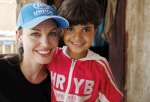- Text size
 |
|  |
|  |
| 
- Français
Massive influx of people into Dohuk as Iraq's displacement crisis deepens
Briefing Notes, 12 August 2014
This is a summary of what was said by UNHCR spokesperson Adrian Edwards – to whom quoted text may be attributed – at the press briefing, on 12 August 2014, at the Palais des Nations in Geneva.
In northwest Iraq, thousands of people have escaped from Sinjar Mountain via Syria and back into the Dohuk governorate of the Kurdistan Region of Iraq over the past 72 hours. According to our NGO partners in Iraq there are now as many as 35,000 people. The new arrivals are exhausted, dehydrated and many have suffered sun or heat stroke, with the daily temperatures reaching 40 to 45 degrees Celsius.
People are moving to places including Zakho and Dohuk town where 16 school buildings have been made available. Food, water and medical care are being provided. As of now, an estimated 20,000 to 30,000 people remain trapped on Sinjar Mountain without food, water or shelter. Access to these families is extremely limited.
According to the mayor of Zakho, his city of 350,000 people just a few kilometres from the Turkish border, is hosting some 100,000 displaced people mainly from Sinjar and Zumar who have fled there over the past week. The local authorities have opened schools and community buildings to house the displaced who are also taking shelter under bridges and in unfinished buildings.
Dohuk governorate is now hosting close to 400,000 displaced Iraqis, including Yazidis, Christians, Shabak, Kakai, Armenian and Turkmen minorities – some of whom have endured repeated displacement. Many are now in the towns of Khanke, Shariya, Zahko, Shekhan and in and around Dohuk town. They are scattered across hundreds of sites. Some are staying with relatives, others are in schools, churches, mosques, parks and shells of apartment buildings without water or electricity. UNHCR is distributing mattresses, blankets, emergency relief kits, household items and hygiene kits to locations in Dohuk, Zakho, Akre, Shekhan, Khanke and the village of Bajet Kandela. We are also witnessing enormous generosity by the local community who are spontaneously handing out aid.
Between 7,000 to 10,000 people are staying at the Bajet Kandela camp – a former reception centre for Syrian refugees most of whom passed through there two years ago after crossing the border at Peshkhabour. While basic facilities are in place, conditions are crowded and local NGOs have been installing family tents on the site wherever space could be found. Site preparations have been completed to extend the camp, and another five thousand tents are being added to the camp starting today. The camp has water, electricity, and other essential infrastructure.
Three more camps are being planned in Dohuk governorate at Zakho, Shariya and Khanke. The Turkish government is expected to being work on the Zakho and Shariya camps soon, while site preparation for Khanke has started with UNHCR technical help and construction expected to begin next week.
In all, there are more than 1.2 million internally displaced people in Iraq, including an estimated 700,000 in the Kurdistan region which already hosts some 220,000 Syrian refugees.
Refugee movements into Syria
Another 10,000 to 15,000 Yazidi Iraqis fleeing Sinjar have arrived in Syria. Most are staying in the Newroz camp near Al Qamishli, run by local NGOs. Other refugees are scattered among various Yazidi villages in Qahtania or urban areas.
UNCHR teams from our Qamishli field office in Syria carried out an assessment mission to Qahtania on Saturday, and provided aid to hundreds of families staying in three villages and a local school. We also distributed tents, hygiene kits, sleeping mats, and other relief items to refugees staying in the Newroz camp which is now overcrowded with people – hundreds are sleeping in the open and more shelter and food aid is needed urgently.
Both refugees and local communities report that more refugees are on the way. Our field teams report seeing local people from nearby villagers were distributing water and basic foods to the refugees on their journey.
For more information on this topic, please contact:
- In Erbil, Ned Colt on mobile +964 780 917 4173
- In Erbil, Natalia Prokopchuk on mobile +964 780 921 7341
- In Geneva, Adrian Edwards on mobile +41 79 557 9120
- In Geneva, Ariane Rummery on mobile +41 79 200 7617





























